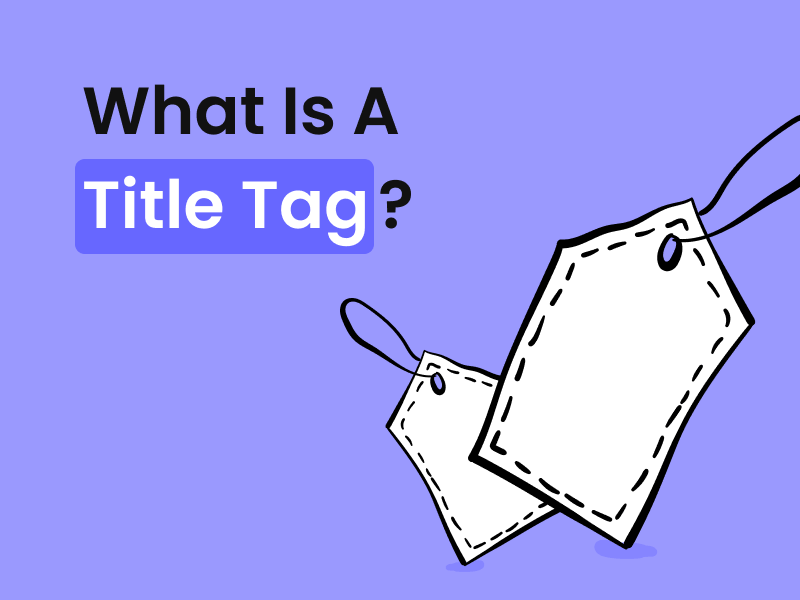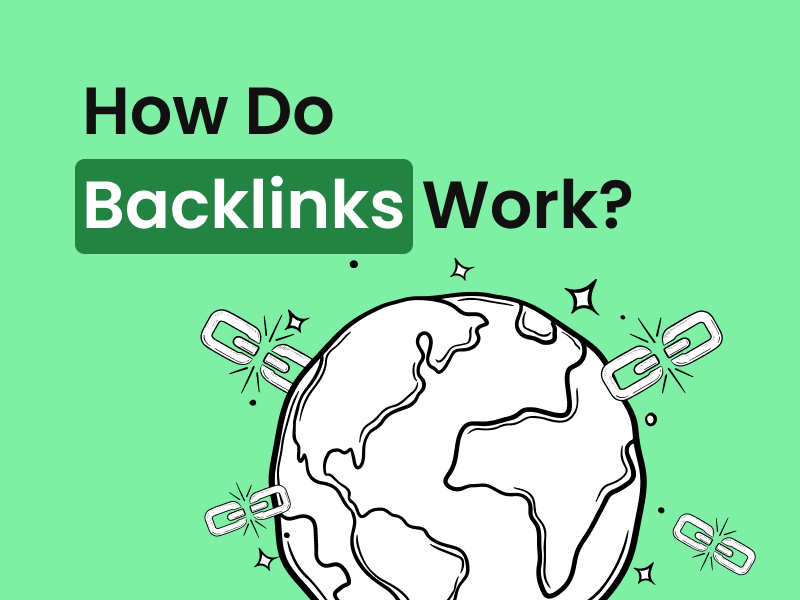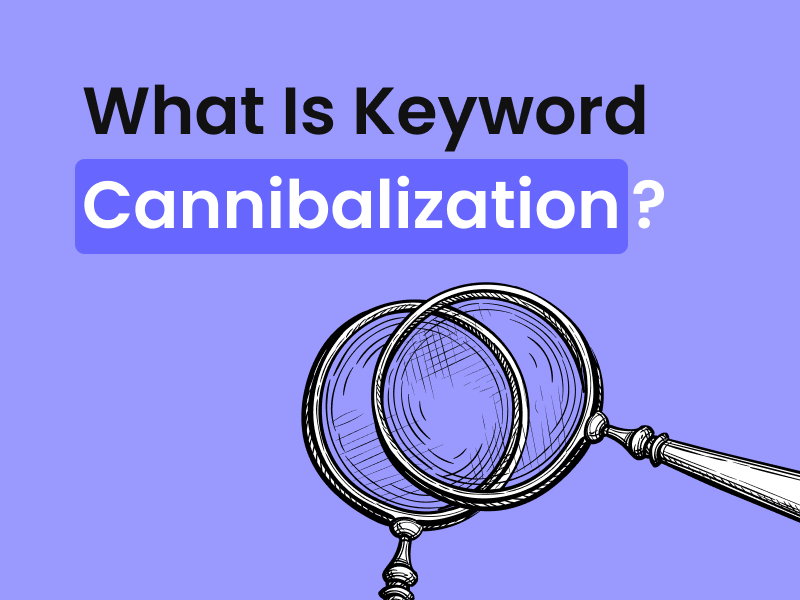How to Use AI for SEO in 2024: The Best AI SEO Writer and SEO Tools For Content Planning
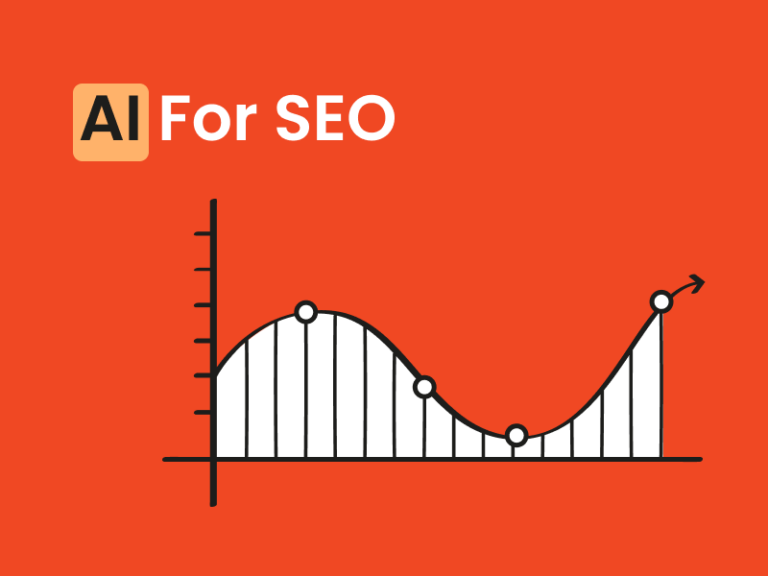
By Melissa Ng | Last Updated 22 December 2023
Introduction
Defining AI for SEO
AI for SEO refers to the application of Artificial Intelligence (AI) in improving the performance of a website in search engine results pages (SERPs), specifically to enhance search visibility, content relevance, and overall ranking on SERPs. Such artificial intelligence tools go beyond simple tasks, they are capable of analysing and providing recommendations for optimisation based on machine learning and natural language processing.
Emergence of AI in the SEO world
AI made its debut in the SEO landscape in 2016 when Google started using it to power its ranking algorithm. However, over the last year or so, AI has advanced from inaccessible and complex technology into user-friendly SEO tools. This development can be credited to the integration of machine learning algorithms and natural language processing.
Today, SEO experts are actively leveraging AI to analyse, strategise, and streamline their efforts. Simultaneously, search engines, with the help of refined search algorithms and AI, deliver more personalised responses to user queries. The rise of AI in SEO signifies the exciting and transformative journey of this technology from infancy to its current wild-west era. The adoption and the sheer potential of AI, further boosted by search algorithms and machine learning, signals a continuous innovation in digital marketing’s future.

Unveiling the Benefits of AI for SEO
Time-saving Advantage of AI
AI significantly curtails the time taken by SEO tasks, being instrumental in automating laborious and time-consuming activities like keyword research and content optimisation. Incorporating workflow tools such as OpenAI API, in combination with Google Analytics or ChatGPT, can streamline your workload process.
By swiftly sifting through data, spotting patterns, and identifying trends, these AI platforms streamline the workflow, making it more efficient. By using an advanced AI guided workflow businesses can automatise task execution that once required a significant commitment of human hours, driving a new level of efficiency and productivity. This redirected effort allows businesses to focus more on strategic planning and marketing campaigns.

Customised Content Generation by AI
AI revolutionises the way content is created by producing customised and highly relevant pieces that drive user engagement and satisfaction. Generative AI, a significant advancement in the AI realm, is leading this revolution, demonstrating exceptional ability in analysing user engagement data such as page views, time spent on pages, and click-through rates, hence creating more engaging content. It’s worth noting how generative AI technologies can produce a plethora of content types, including blog posts, articles, website copy, and social media posts. This adaptability reduces the content creation workload, enabling businesses to focus more on other vital aspects.
Furthermore, generative AI makes hyper-personalised content possible, setting it apart from other technologies. Generative AI-powered tools provide user-specific content that elevates the consumer experience and augments content relevancy, a salient factor for SEO ranking. Notably, tools like the SEO content editor aid in optimising this content by scoring it for SEO. Whether it’s fresh content or a revisit of old, published articles, the SEO content editor ensures your content perpetually maintains its SEO relevance.

Top AI SEO Tools for Superior Organic Performance
Highlights of best AI SEO Tools
When it comes to the best AI SEO Tools, several reputable options deserve mention:
- BrightEdge: Known for its unique Hyperlocal feature, BrightEdge offers precise keyword mapping and content suggestions specific to certain regions, cities, or countries. It’s an AI-powered SEO tool that also includes keyword reporting and intent signal features.
- Can I Rank?: Using modern data analytics, Can I Rank? supplies insights for improved rankings. It excels in identifying opportunities in SEO, content, and social areas by providing recommendations based on keyword difficulty scores.
- Diib: Diib provides comprehensive SEO solutions such as measuring performance, managing analytics, and identifying opportunities. It offers keyword suggestions to boost rankings and a comparative analysis against industry and competition benchmarks.
- Pave AI: This AI-based tool boosts marketing strategy by collecting data from various ad platforms. PaveAI offers personalised data-driven recommendations by journeying across millions of combinations on all marketing channels.
- WordLift: This tool enables your website to speak Google’s language by converting content into structured data. WordLift provides features like Automatic Schema markup, rich snippets, and content recommendation widgets.
- Alli AI: An all-in-one SEO platform, Alli AI simplifies the SEO process and enhances your website content strategy. It assists with keyword research, building quality backlinks, and holistically optimising content. Notably, Alli AI also offers a 10-day free trial period with full platform access.
- Copy.ai: Copy.ai is a tool that aids in content creation on multiple platforms, allowing for easy edits and regeneration of content with brief input.
- Frase: Frase is a tool that allows for the optimisation of content, evaluating the relevancy of your content with respect to the user’s query applying AI.
These tools each offer different capabilities, and the choice ultimately depends on your business needs and strategy.
Looking for more SEO tools? Read our blog post: The 10 best SEO tools and hacks

How to use these tools effectively?
Effectively using AI SEO tools requires both a solid understanding of the software and an advanced SEO strategy. This understanding becomes even more vital when working in an SEO agency or managing SEO teams. Here are steps to maximise the value of AI for SEO:
Understand AI SEO Software: Before your SEO team starts using AI SEO tools, it’s crucial to grasp their intricacies, how they function, and how they can bolster your SEO strategy. Because different tools, like Alli AI, offer various capabilities, understanding their features can ensure you select the best tool for your agency’s needs.
Set Clear Goals: Determine what your SEO agency aims to achieve with AI SEO. These goals, perhaps boosting organic traffic or enhancing user experience, should guide your team’s use of AI in the SEO realm.
Use AI for Keyword Research: SEO agencies can engage AI-powered tools like Alli AI to explore new keywords. Such tools can analyse text from search data, page content, or even backlinks to suggest new relevant keywords and phrases.
Leverage AI for Content Generation: Tools like Copy.ai and WordLift can aid SEO teams in creating optimised content, headlines, blog posts, FAQs, similar to what resonates with your target audience.
Utilise AI for Analytics: Your SEO agency can utilise AI to analyse your site data, providing insightful information. These insights can quickly help optimise your website for better SERP rankings without the need for developers or complexities of coding.
Always Test and Improve: Lastly, always test your SEO strategy and analyse the results. AI SEO tools present predictive analytics and performance reports that can help your agency understand your SEO efforts’ effectiveness and find areas for improvements.
By integrating AI SEO tools like Alli AI into your SEO agency’s strategies, you can use data-driven insights to make more informed decisions and guide your SEO efforts towards greater success.
Read our introductory article to get started: The Complete SEO Guide For Dummies: Search Engine Optimisation For Beginners

Getting Started with AI for SEO
Finding your AI for SEO software
Choosing the right AI SEO software depends on your business needs, SEO goals, and budget. An essential part of this endeavour is deploying effective strategies like keyword research and, most significantly, content optimisation in line with your ‘target keyword’. Understand your current SEO performance, identify weaknesses and potential areas for development, then source a tool that aligns with these goals and offers suitable features. While determining your AI for SEO software, consider the following factors:
- Features: Consider the key features the software offers. These should include keyword research, content optimisation related to your target keyword, website performance analysis, and analytics among others.
- Usability and Interface: You need software that is user-friendly and easy to navigate, even for those without a technical background.
- Training and Support: Look for software that provides adequate training and reliable customer support to ensure a smooth operation.
- Budget: Choose a tool that aligns with your budget. Remember, the best software for you may offer excellent value for money, even if it isn’t the cheapest option.
- Scalability: As your business grows, you should be able to scale up your SEO efforts using AI technology. A scalable AI SEO solution is a good, future-proof investment.
Among the popular options for achieving these objectives are Semrush, SE Ranking, Surfer SEO, Clearscope, and many more. Each offers a unique blend of features and functionalities, enabling businesses to enhance their online presence and visibility by effectively targeting specific keywords.
Remember, choosing the right AI SEO tool requires enough time and careful consideration. You need to test different tools, ask the right questions, and gauge their potential in boosting your SEO campaign, especially concerning the success with your target keyword.

Leveraging AI for topic analysis and content strategy
AI has revolutionised the way we conduct topic analysis and build content strategies. By employing AI tools, content optimisation, and automated content briefs, you can streamline your content creation process to better align with SEO practices and elevate your visibility on SERPs. Below we delve into how you can leverage AI for improved topic analysis, superior content strategy, and effective blog outlines.
Understand Your Audience: AI enables you to understand your target audience in greater depth. It provides comprehensive analytics about the topics they are interested in, allowing you to craft content — especially SEO blogs — that mirrors their search behaviour and serves as a valuable resource to them.
Identify Gaps in Your Content: AI conducts comprehensive content gap analyses, revealing potential areas for improvement within your content strategy. More specifically, it can highlight whether there are specific topics your competitors are reaching with their content outlines that you might not be, guiding you to fortify your content accordingly.
Keyword and Topic Suggestions: AI-powered SEO tools come with content scoring features that provide relevant keyword and topic suggestions your audience is most likely to search for. This paves the way for crafting a blog outline or comprehensive content outline that harmonises with your users’ query intent and effectively boosts your SERP presence.
Optimise Existing Content: Not just generating new content, AI proposes amendments to your existing content, enhancing its SEO value. Enhancements could involve modifying SEO semantics, improving readability, modifying keyword usage, or optimising relevant links. It’s like having an AI Outline Generator at your disposal.
Topic Clustering: AI has the astounding ability to group and categorise related topics, known as a trend of ‘topic clustering.’ This facilitates the development of custom templates and organised content outlines, creating a more user-friendly content journey that’s beneficial for both users and search engines.
Utilising AI-powered tools, businesses can construct content strategies that truly resonate with their audience’s needs and search intent. Such frameworks developed result in SEO-optimised content, including blog outlines that are not only rich in quality but also geared towards improved SERP rankings.

Delving Deeper into SEO Content Optimisation Tasks
Optimal use of AI in SEO writing
Optimising the use of AI in SEO writing requires a clear understanding and integration of certain practices. One such practice is the strategic incorporation of SEO keywords into your content. Here’s how to get the best out of AI for SEO keywords infused writing:
Keyword Research: Use AI tools for automating and improving your SEO keywords research process. AI can help you find top-performing long-tail keywords, understand keyword competitiveness, note down recurring themes and suggest semantically related keywords you hadn’t considered.
Content Creation: AI can also help ideate and create SEO keyword-optimised content. AI tools like Jasper, Writesonic, and Copy.ai can create unique content in a variety of formats, from SEO-driven blog posts to SEO-enriched social media content.
Content Optimisation: Let AI take the guesswork out of content optimisation. Tools such as Surfer SEO and Clearscope can analyse your content in real-time, suggesting improvements for keyword density, title optimisation, usage of synonyms, and more, honing your content’s SEO relevance.
Readability and Tone: Use AI to ensure your content is easily readable and fits the tone of your brand while maintaining SEO efficacy. AI can adjust vocabulary, sentence length, and complexity to match your target audience, keeping your content SEO-friendly and accessible.
Personalisation: AI enables content personalisation at an unprecedented scale. With AI, brands can serve readers with personalised traffic-driving SEO content based on their browsing and purchasing history.
Remember, the goal of AI in SEO writing isn’t to replace human writers but to assist them. Leveraging AI tools like the featured Grow Flow, which provides weekly SEO insights to identify high-ranking keywords, can make your content better aligned with SEO best practices. It also frees up time for content strategists and writers to focus on more complex tasks.

Ensuring content originality using AI tools
AI-powered plagiarism checkers are making it easier to ensure content originality, an essential aspect of SEO. These tools output test results using advanced algorithms to identify instances of duplicate content, and suggest ways to further enhance originality. Here is how you can harness these tools to ensure content originality:
Real-time Duplicate Content Detection: AI plagiarism tools conduct an output comparison of your content with billions of other documents found online to detect similarities. These similarities are indicated real-time as you write, thereby eliminating the possibility of accidental plagiarism.
Detailed Reports: Most AI plagiarism checkers output detailed reports that indicate precisely where copied content might exist. This comprehensive feedback makes for quick and precise rectification.
Enhancement Suggestions: In addition to identifying plagiarism, these tools also output suggestions to increase your content’s uniqueness. Suggestions may include reordering sentences, changing the words used, or proposing varied wording, making your content stand out from the rest.
Beneficial for SEO: Ensuring content originality not only imparts credibility in your content, but also shields you against plagiarism penalties imposed by search engines. Search engines like Google can penalise duplicative content, which can adversely affect your SEO efforts.
AI tools like Grammarly, Copyscape, and Turnitin effectively serve this purpose, flagging potential plagiarism and offering you suitable corrective measures. This output is immensely helpful for content creators, SEO specialists, writers, and businesses aiming for superior SERP rankings.
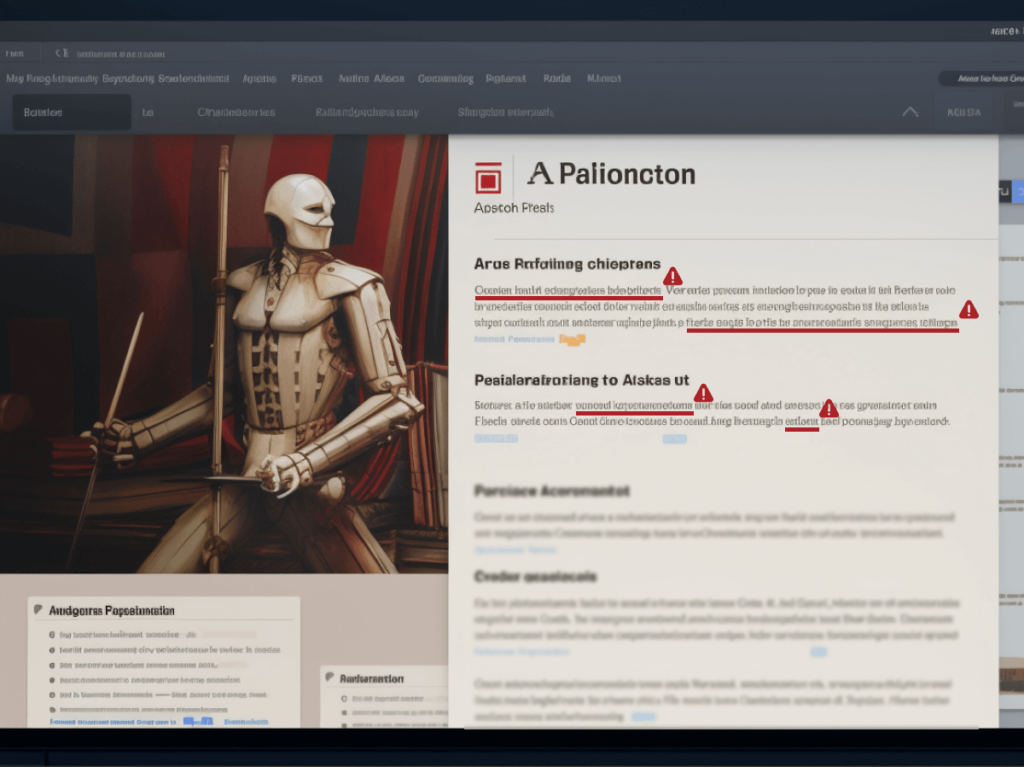
The Future Standpoint of AI-Driven SEO
Predictions on AI revolutionising the SEO landscape
AI’s role in SEO strategies is only expected to grow. The integration of AI into SEO will bring about astonishing shifts – including daily automatic updates and updates on demand from tools such as Pro Rank Tracker (a feature that’s becoming increasingly pivotal in the industry). Here are a few big-picture predictions on how AI will continue to revolutionise the SEO landscape:
Hyper Personalisation: Not only will AI make it possible to fine-tune content, making it more suited to the individual user, but it will allow for real-time updates on user behaviours, interests, and patterns. Expect hyper-personalised, updated content, delivering highly tailored recommendations to users.
Better User Experience: AI will redefine user experience by offering more intuitive, user-friendly website designs, and interactive elements. This will drive superior user engagement and higher dwell times, as well as give real-time updates on user interaction metrics.
Smart Keyword Research: In terms of updates, AI will enhance current keyword research practices – by providing more effective options accounting for user intent, context, and synonyms, thanks to updates in semantic search advances.
Voice Search Optimisation: As voice-activated systems become increasingly prevalent, steady updates in AI will play a pivotal role in optimising voice search. Non-structured queries will become more common, and AI’s role in interpreting these will grow.
Visual Search Optimisation: The field of visual search — the ability to search using images rather than text — will increase. AI, already a player in this through image recognition technology, will likely improve further with constant updates.
In short, incorporating AI into SEO will fundamentally transform digital marketing strategies. Thanks to ongoing updates and innovations propelled by AI, we can expect more efficient, tailored, and user-focused SEO practices. Thus, businesses must now find ways to harmonise AI into their SEO to remain competitive in the ever-progressing digital landscape.

Preparing for AI-oriented changes in SEO
As AI continues to reshape SEO, businesses must stay ready to adapt and leverage these changes. Here’s how to prepare for AI-oriented changes in SEO:
Stay Up-to-Date: It’s important to keep a watch on the latest trends in AI and SEO. Understanding how AI is changing SEO – from significant algorithm changes to subtle shifts – can help your business anticipate and adapt accordingly.
Understand User Intent and User Data: With AI becoming increasingly adept at deciphering user intent, SEO strategies should shift focus more on addressing user needs, less on satisfying algorithms. Greater emphasis should be on the analysis of user data to identify patterns, anticipate user actions, and enhance user satisfaction.
Voice Search Optimisation: Optimise your website for voice search. The growth of voice-activated AI assistants underpins the importance of voice search optimisation for maintaining visibility on SERPs.
Invest in Learning and Data Analysis: The integration of AI into SEO makes it urgent for SEO specialists to deepen their knowledge of new AI technologies and tactics. One aspect of this learning involves the use of AI tools to analyse user data, identify engaging content, and predict user preferences.
Experiment with AI SEO Tools: The market is rife with AI SEO tools, each promising unique benefits. Invest time to trial and test various software, looking out specifically for tools capable of in-depth analysis of user data.
Prepare for Non-Traditional Searches: Beyond voice and image search, the rise of AI presents innovative search modes like visual and digital personal assistant searches. To stay competitive, your SEO strategies should expand to accommodate these nontraditional searches.
In conclusion, as AI and user data become more enmeshed with SEO, businesses need to uphold their commitment to learning new technologies and techniques.

Dos and Don’ts when implementing AI for SEO
Effective practices for AI SEO usage
The dynamic synergy of AI and SEO can serve as a formidable driver of your website’s visibility and credibility, if harnessed correctly. Incorporating optimisation processes can bolster this synergy even further. Here are several effective practices for AI SEO usage:
Define Clear Goals: As with any tool or strategy, AI SEO usage should be goal-oriented. Whether your objective is to improve targeted traffic, user engagement or site ranking, clear goals will guide your tactics and optimisation processes.
Strategic Content Generation: Use AI tools to generate SEO-rich content. These tools can not only automate your writing but also execute optimisation processes to ensure optimal keyword density, perfect readability and high relevance to your audience.
Optimise User Experience: Leverage AI for improving website user experience. This can include enhancing website speed, responsiveness, navigation, and supporting voice search, all through effective optimisation processes.
Robust Keyword Research: Use AI to conduct extensive keyword research. Optimisation processes involved in AI’s predictive engines and data analysis can predict future trends, offering you a competitive advantage.
Monitor and Adjust Strategy: AI provides detailed analytics and predictive insights. Regularly monitoring these and conducting optimisation processes can help you tweak your strategy to optimise results.
Prioritise Mobile SEO: With mobile internet usage on the rise, prioritise mobile SEO. Optimisation processes involved in AI can contribute to this with responsive web designs, mobile-friendly content, and voice search optimisation.
AI is driving the future of SEO, equipping businesses with key insights, reducing manual workload, and through optimisation processes, ensuring an edge in the increasingly competitive digital landscape. Cultural readiness to accept and adapt to AI in SEO strategy — including optimisation processes — is crucial. Businesses that embrace these effective AI SEO practices stand to enjoy a substantial competitive advantage.
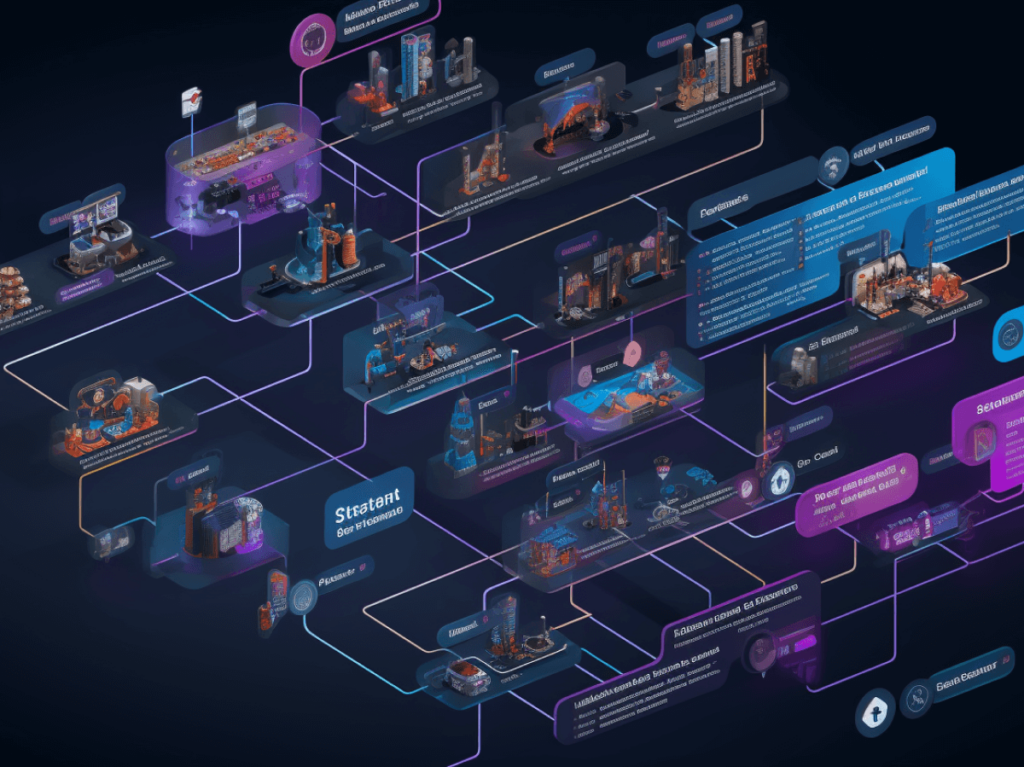
Pitfalls to avoid while integrating AI with SEO
Correctly integrating AI and SEO is paramount in achieving effective search optimisation. Here are some common pitfalls to avoid:
Over-reliance on AI: While AI can efficiently generate website page content and automate numerous tasks, it can’t replace human creativity, subject matter expertise, and instinct. It’s crucial to strike a balance between AI automation and human ingenuity.
Ignoring User Experience: AI can greatly enhance SEO efforts, but it shouldn’t distract from the importance of improving user experience. Always prioritise enhancing the user’s browsing experience.
Neglecting New Formats: AI is speeding up the emergence of new search formats such as voice and visual search. Ignoring these could render your SEO strategies obsolete.
Not Keeping Updated: SEO and AI are rapidly evolving fields. Failing to stay updated on new algorithms, tools, and trends like the AI Outline Generator, can result in ineffective strategies.
Misinterpreting AI Capabilities: Misunderstanding what AI technology can and can’t do might result in ineffective applications or unrealistic expectations. Invest time in understanding the capabilities and limitations of your AI SEO tools.
Neglecting Website Performance: In the pursuit of perfectly crafted content and keywords, don’t underestimate the importance of website performance. Slow-loading platforms impact the page speed which, in turn, affects the website’s rank in SERPs. Complicated navigation and improperly formatted mobile presence can also detrimentally affect SEO, irrespective of how advanced your AI is.
By avoiding these pitfalls, businesses can leverage the strengths of AI to drive effective SEO results, enhance online visibility, and stay ahead in the dynamic field of digital marketing.

Frequently Asked Questions (FAQs)
What are the cost-effective AI SEO tools available?
Several cost-effective AI SEO tools can help businesses improve their organic performance without breaking the bank:
- SE Ranking: This all-inclusive SEO software offers affordability and robust features such as competitor research, keyword tracking, and website auditing. It is efficient in boosting search rankings by providing beneficial insights about prevailing trends and algorithms.
- Outranking: Outranking is an economical tool for solo content creators and companies with smaller teams. It strategically utilises AI to weave SEO-friendly content, precisely tailored to user search intent and content quality, all crucial factors for climbing the search rankings.
- Frase: This cost-effective AI SEO tool aids in creating content briefs, optimising content, and conducting content research, which contributes to noteworthy improvements in search rankings.
- Ubersuggest: This popular and cost-efficient tool, packed with features like keyword research, site audit, backlink data, and more, provides a complete solution for businesses aiming to achieve higher search rankings.
- Zutrix: It’s a cost-effective, accurate, and real-time Google rank tracker tool. An excellent assistant for keeping a close eye on fluctuating search rankings, allowing prompt adjustments to your SEO strategy as needed.
- Mangools: Known for its simplicity, Mangools encompasses different tools including KWFinder, SERP analyser, and site profiler, all available at an affordable price. It’s a one-stop-shop for SEO needs, significantly influencing your website’s authority and lifting its search rankings.
Prices for these tools vary, and most offer a free trial or freemium plan, enabling you to test out the platform before opting for a paid subscription. Remember, it’s not about finding the cheapest tool, but the one that offers the best value for enhancing your business’s search rankings.
How can AI SEO tools enhance website functionality?
AI SEO tools have the power to enhance website functionality in several ways:
Improved Speed & Performance: AI can analyse your website to identify areas slowing it down, suggesting improvement measures such as code optimisation, adaptive image sizes, and server upgrade. AI tools can improve your content creation process. Apart from suggesting optimisation for existing posts, these innovative tools can generate drafts for a marketing blog, all while maintaining relevance to users and preferred keywords. An editor then steps in for review, enhancing authenticity and fact-checking information.
Enhanced User Experience: By deeply studying user behaviour, AI tools can help tailor a more individual-focused online experience, advising changes in navigation structure, content placement, or design tweaks.
Improved Accessibility: AI can help pinpoint accessibility issues on your website, such as improper contrast colours or images lacking alt texts, and suggest solutions to make your site more inclusive.
Intelligent Chatbots: Incorporation of AI-powered chatbots can slash waiting times, automate responses to frequently asked questions, and provide direct communication channels. These tools significantly boost user experience and customer support.
Regular Website Auditing: AI tools, like an AI content assistant, can automate regular website audits, detecting unexpected changes, broken links, or errors before they impair your SEO performance, potentially saving your marketing blog from setbacks.
By enhancing website functionality, AI SEO tools not only improve your site’s technical SEO but also contribute towards building a more user-focused, accessible, and engaging marketing blog that excels in SEO and user experience.
Disclaimer
Some of the links in this post are affiliate links. This means if you click on the link and purchase the service, we may receive an affiliate commission at no extra cost to you. Rest assured, we only recommend products we believe will add value to our readers.
Submit An App
Seen a cool app you think we should review? Submit your recommendation using our form.
